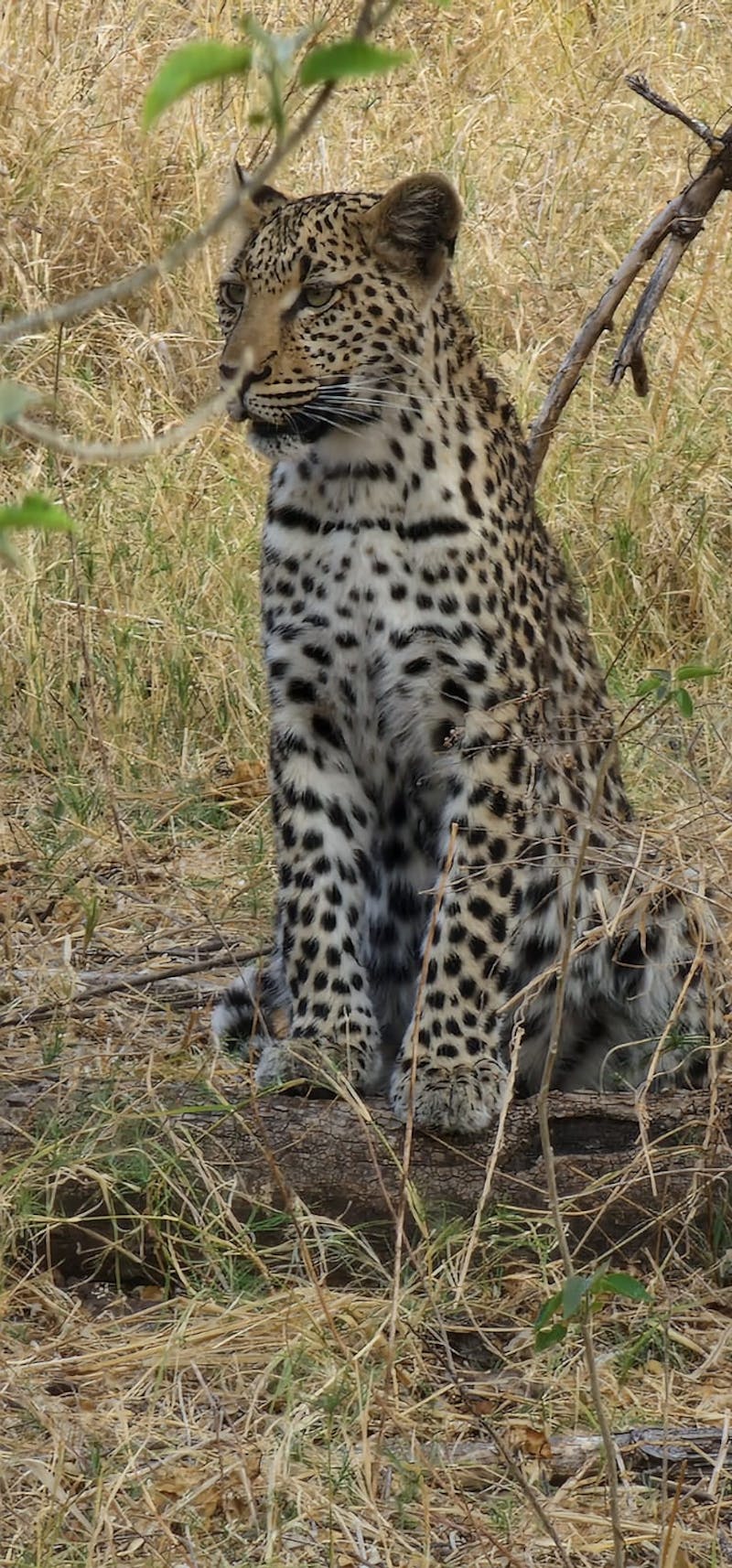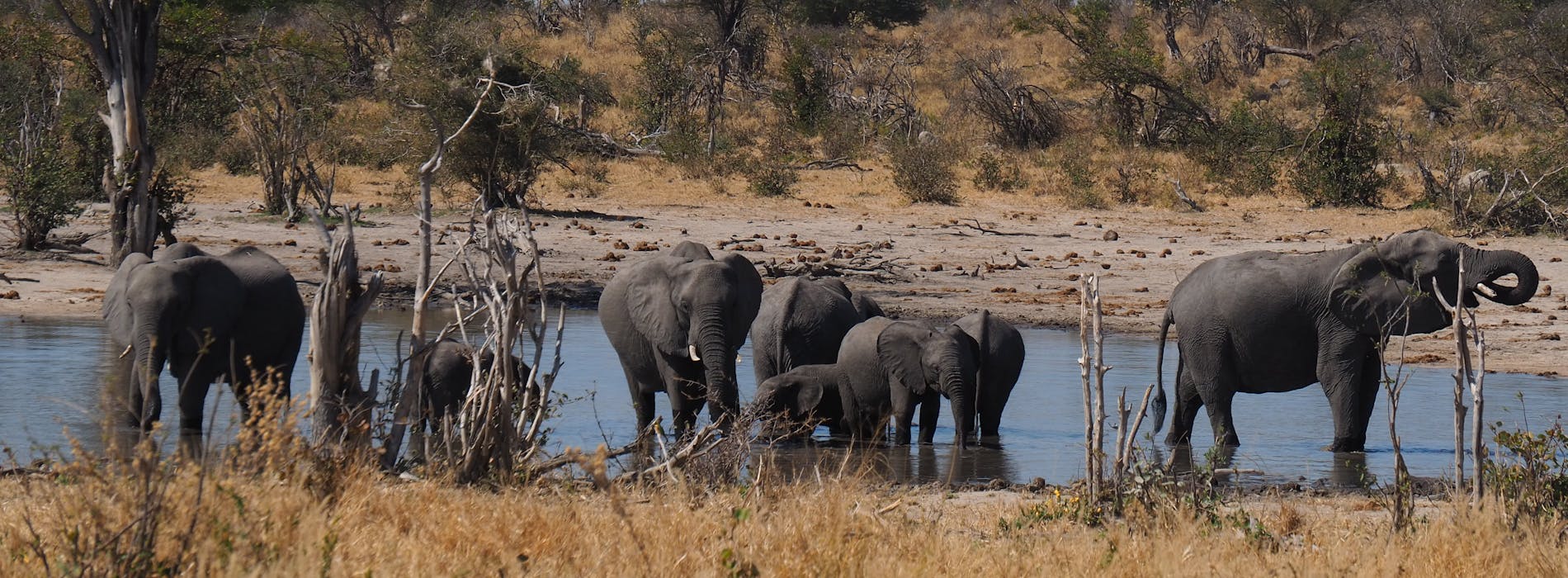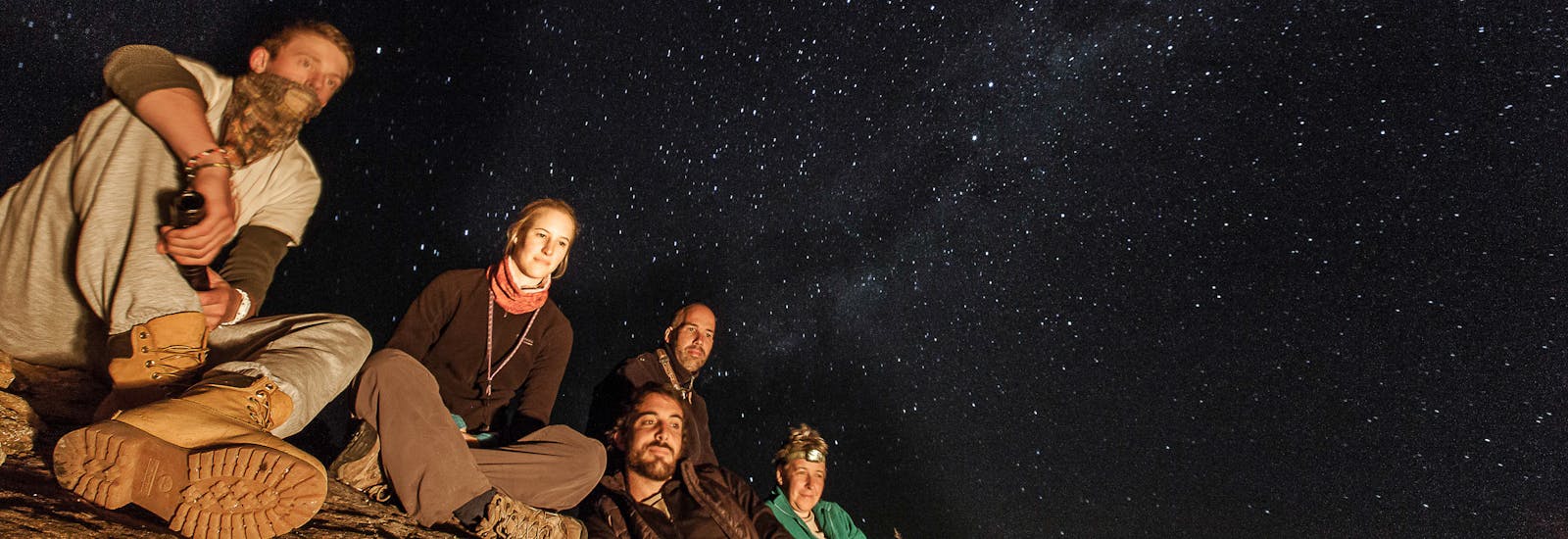
Heeding the call - reflections from the Game Ranger's Course
Who has not dreamed of sneaking through the tall grass of the African savannah, the sun slowly dipping below the burning horizon, looking for the mysterious troop of lions you heard calling in the night?
I held this dream with me ever since I was a child. In love with Africa, I always wanted to tread its soil and meet its rich and varied wildlife. Fear and fascination envelop me every time I think about it.
I convinced myself I needed to leap into this world some time ago. I wanted to immerse myself, to understand better what the word "Wild" really means. I needed to escape the world I had found myself living in, too superficial and without magic for my taste…
I started my journey on the Internet, searching for the perfect project to satisfy my wanderlust and thirst for knowledge. My search quickly turned up the gem I'd been looking for.
Work with the wildlife
African Conservation Experience (ACE) is an organisation that I was already aware of. Many of my friends took an alternative holiday with ACE and returned with stars in their eyes and a satisfying sense of accomplishment.
To become a conservation volunteer is to make a valuable contribution to protecting wildlife and ecosystems. It is also an opportunity to understand some of the issues from which we are often too detached.
By browsing through the different missions, each more exciting than the last, I realised I wanted to be a conservation volunteer and deepen my knowledge about African wildlife. I wanted to be an active team member and a full-fledged student: action and education.
Finally, I came across the Game Ranger Guide Course! Am I walking in the bush to track animals? Learn to situate myself for my survival? Studying animal behaviour and adapting myself to dangerous situations? All that, with a good dose of action and interaction with animals? Click, book, fly.
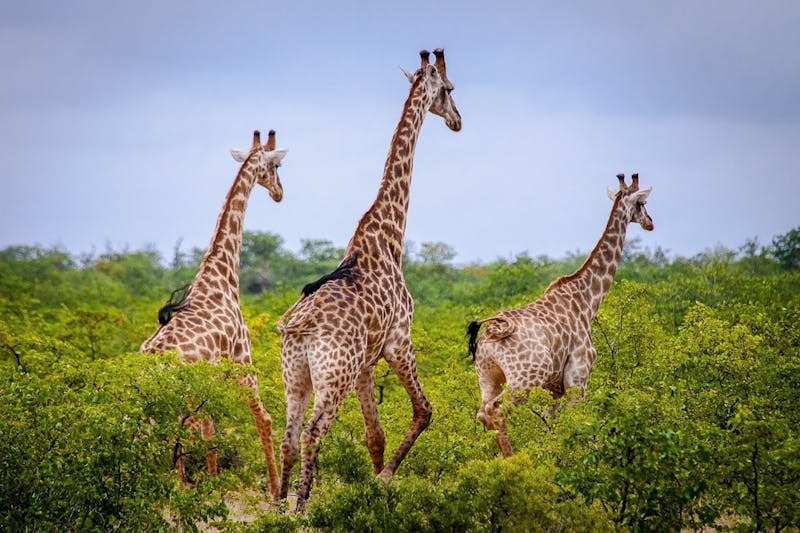
Introduction and immersion
May 20, 2014, Johannesburg airport. The last gulp of civilisation before plunging into the wonderful world of the South African bush. I dive into the back of our vehicle to meet my future companions, colleagues and game partners. I listen to everyone's story and what led them to this course. We all have the same desire: To experience the great wild!
I remember Martin's words while the landscape whips past my eyes and houses become fewer and far between, giving way to the Africa that captivates me. Martin, the ACE manager we met at the airport, explained that we were there to participate in a large-scope project. More than just students, our commitment must be complete. Simply put, ACE needs us.
After a few hours' drive spent in good conversation and laughter, we arrived at our final destination: The Mapungubwe Nature Reserve. This reserve, one of South Africa's northernmost, will be our base camp for a week. I will stay with four other volunteers: Nina (Australia), Sabine (Switzerland), Jo (UK), and René (Botswana).
The immersion is total and immediate: we stopped in the middle of the bush after passing through the massive entrance gate. In the darkness, we just hear a vehicle's sound in the distance. A few minutes later, its powerful headlights dazzle us. Stopping in front of us, a man grinning out of the car approached us. A mixture of authority and kindness emanates from him. Don Bird will be our guide, teacher and educator during these seven days. And more than that…
After quick introductions, we jump into the back of the bakkie. The vehicle started, and we picked up serious speed. The fresh air of the African night whips our faces, illuminated by broad smiles. We know that animals are there, all around us. We feel them. The adventure begins, and we are ready… I mean, we thought we were ready!
Don's speech puts us back in our place. "You are, no more, on the top of the food chain," he says. "In this wilderness, the Bush is the king, and caution is one of the most useful virtues."
Boomslang, Puff Adder or the Black Mamba will be our invisible companions throughout our stay. At the mention of these iconic and terrifying snakes, we have a moment of panic. Eyes glued to the ground, we scan the area long and wide. No sign of movement! Maybe because we do not know how to spot them…for now!
After explaining the course and the art of living in Mapungubwe, we enjoy our first traditional meal together as "ranger guide apprentices." To get to know each other, Don asks each of us a simple question: What was the moment, the experience, the meeting that moved us the most? The one that, when shared, always brings a "WOW"?
Everyone shares their story, and our "WOWs" spread out into the darkness of the bush, accompanying the distant hyena's "laughter."
6:00 am. The sun stretches in the sky and warms the wet savannah. We wake up with the feeling of being at the end of the world. But above all, burning with the desire to discover it all, understand it and become a small part of it. After breakfast, we meet JC and two of his apprentices, Ampie and Johan. They will be our eyes and ears, with ours not yet sharpened to read the bush. They will form the team that will surround us during our many walks. Rifle to shoulder, we cross our fingers that they never have to use it! For our sake and that of the animals…
Our first step is to make a quick survey of the reserve and start to find our bearings in our new environment. We soon realise that we need to gain altitude. The hill, in the distance, will do nicely. In his deep voice, JC gave us the first instruction to orient ourselves in an unknown space better. With the sun and time, the most logical and visible mark, we can determine the North. This is already a good starting point to survive in the bush.
"But at night, how do you do that?"
"Be patient, one thing at a time."
The reserve is so large that it would take years to explore. Don also tells me that he never set foot in remote parts of the reserve. A 4×4 tour is therefore necessary to take in more of the landscape – It will take us the rest of the morning. The study of different parts of the border shows that elephants enjoy destroying fences close to their boundaries. And you know how? They are simply pushing their calves so they roll over them! A smile spreads across my face, amused by the intelligence and resourcefulness of these pesky pachyderms.
Discovering the bush happens on two fronts: In the field and the classroom! After surveying the territory in the morning, Don invites us to take inventory of all species that call it home. Today, as on most days, we join him in the classroom for a few hours of study.
A ranger's crucial attribute is to deeply understand the animals in the area, their physical characteristics and their behaviour. To read the bush and understand the stories it tells us to ultimately take in all it has to offer us … safely!
Practice time! Our first walk in the bush to get familiar with track identification. We all have a go at identifying which tracks could belong to which animal, found along the road, during our safaris or even on the beach. Well, we were off the mark. It is fantastic to see the number of identifiable elements that determine the membership of the footprint to a particular species.
JC found us some beautiful fresh traces of what appeared to be a cat. He explains how to position ourselves to read (the sun in the back) and shows us the elements to analyse: The number of indentions, claw marks, the spacing between the front legs and the back legs, and the depth of the footprint. I then learned how much knowledge you need to know which animal you are dealing with. And then to track him down … "But that's for another story, another day!"
I want you to learn about Africa's science
It is with a steadfast desire to learn that we begin our second day. It will continue to increase throughout the week. Every day brings new knowledge, anecdotes and stories.
On our first morning trip, we had the chance to spot our first towering giraffe in the distance. What must be understood is that in Mapungubwe, we face natural wildlife. Indeed, they can roam between South Africa and Botswana through the Limpopo. The direct consequence: They are not at all accustomed to man. The mere sound of a car engine, even at 300 meters, scares them into a stride.
Our only way to observe more closely is to approach on foot. Ampie leads the way, and Johan brings up the rear. All on watch, we avoid being spotted by these long-necked animals. Walking downwind is the first thing to do, so the animals can't detect our smell. Forty meters from the group, we root ourselves to the spot and enjoy the magical spectacle that Mother Nature gives us. Intense emotion overcomes me: I'm living a unique moment like never before. Closer to these magnificent creatures than ever before. I'm connected to them, part of a whole, which I have absolutely no desire to disturb … So I stay in the shadows of an acacia, silent, eyes and heart wide open.
On the way back to base camp, we examined more tracks and began to have fun with this little game. JC gave us more information to consider to complete our task. Thus, droppings become a vital clue in identification. He also wants us to take in the environment when reading tracks to have an entire consideration of the scene: Why did the animal cross the road at this point? Why are those branches broken on the side of this trail? What caused this streak behind the tracks?
He makes a point that we have to learn the language of the bush: "I want you to learn Africa's Science, so you'll be able to get the wider picture and track those animals properly", JC said
We understand that it's not enough to learn the bush in the books; you need to experience it. We must walk it, feel it, to understand it. He wants to convey that message to us: the true soul of a Ranger!
Nevertheless, lectures are still needed in light of our (still) slight knowledge of the subject, so after a light lunch, we reach Don's classroom. Reptiles, amphibians and arachnids are on the menu. The afternoon is rich in education even if everyone's mind inevitably escapes into the surrounding bush… the call is, each day, becoming stronger. "Who's up for a night game drive?" "You know how to speak to us, Don!"
Do you know the mark of the perfect Ranger guide? Aside from the cartridge belt and sturdy boots, the 4×4 vehicle is one of the essential tools of the trade. It is vital to take care of. Thus, every morning, some rituals are observed. Inspecting the vehicle's condition is critical: oil, tires, fuel, brakes … Even if we are learning to survive in the bush, it is better to be home before nightfall!
After our daily mechanical check, we're leaving for the wild. From every bird species, we learn a new story and further information about the bush from the past and with each new tree observed, we know a unique species. This ecosystem contains priceless treasures. We are no longer connected to the human world, where technology and profits are the prime forces, forgetting the wealth around us. Reachable to everyone who knows where to look. We forgot that the Mopani tree is like a large pharmacy. We forgot that it is sufficient to observe the behaviour of the sand grouse in finding a water source. They will inevitably bring us to it. Essential knowledge is no longer practical in an urban environment, where humans have shaped nature to their will. I understand that to want to be a Ranger is also a desire to live differently. Being as close to our planet's essence and feeling connected belong to it. At this moment, driving under the hot sun, I also want to be part of it. I am far from being a Ranger Guide, but I am just beginning to understand their philosophy.
The morning is dedicated to finding the lion whose tracks JC observed earlier. A lion! Our excitement is at its peak, especially for our first animal tracking … on foot! It's not bad for the first time. Arriving on the scene, we jump from vehicles and begin our tracking. We need patience and concentration to follow the tracks closer to our mark. In a line, walking in the same direction, we analyse and follow the trail. One print after another. Many factors can complicate our reading: The passage of a herd of wildebeest on the trail annihilates two hours of work. Unable to continue our tracking, we are just about to give up … But we didn't count on the experience of JC. Staring at some more dense forest a hundred meters from us, he turns to Johan and asks him to follow him. A few seconds later, they disappear through the lush vegetation. It will take us ten minutes to understand what is happening: JC has found the lion. Wanting to be sure about his analysis, JC proposes to put a camera trap at the entrance of it. This is the first time I have my hands on this little gem of technology. But, to my delight, it will not be the last time.
"Let's go back to the camp! We'll take it back tomorrow morning and check out the pictures!" I can't wait.
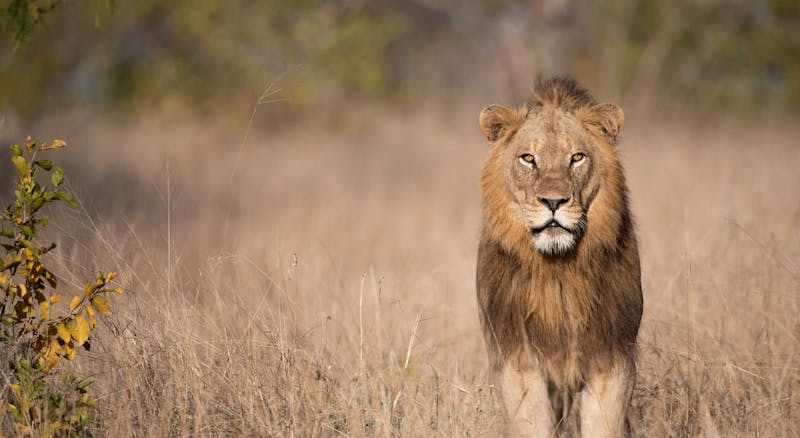
Again, we are in the classroom with Don to spend a studious afternoon. A big chunk ahead: Bird identification. Don will make us proud and offer us a full range of sound effects to accompany the carefully prepared photocopies. I've always been amused that the rangers are often more excited about observing birds than meeting the Big 5. But the scarcity of certain species and their freedom to fly to horizons remind me that the reason is apparent. However, please don't ask me to be as amazed by a grey hornbill as I am by tracking leopard!
What we will learn this afternoon will stay with us for the rest of the stay. Stop and listen if you're in the bush, in the forest behind your house, or on a long beach that borders your town! Take the time to hear and experience all that life teeming around you. Wildlife is everywhere, and birds are its music. I could let myself be lulled by their sweet melodies indefinitely.
With a fire burning and my belly filling this evening, I get carried away by African scoop owls and other nightjars. I escape in this ocean of sounds that is the hallmark of the African night. Only Don's jokes and ensuing laughter get me out of this semi-hypnotic state… It's time for me to let my companions find Morpheus's arms!
"Well, unfortunately, no lion! "JC says, watching the little pictures captured by the camera trap (this one is only triggered by movement). There has not been much overnight. Facing our disappointment, Don proposes a game to bring our general excitement to new heights and fire up our competitive spirit.
There are two camera traps and two teams: Girls (Nina and Sabine) vs. Boys (Jo, Rene and me). The goal is to divine the best place to put the camera trap and obtain maximum exciting shots. The winning team (because, of course, we need one) will be the one who gets the most beautiful and varied images. As simple as that!
But how do we define a location for our camera for the most exciting results? The key is to find a transition zone with traffic. The tracks will be our best allies. The boy's team opts for an ample and open space where many traces of passages are observed. The girls decide to move towards a dam we identified in the past few days. They hang their camera trap on a tree trunk facing the water reserve. Moist soil is covered with hoofprints. They set their camera so that each movement will trigger it. We must, therefore, clear the space in front of the camera: a branch, some wind, and you're good for thousands of unusable shots! Observing their set-up, I think they found a pretty good spot. My competitive spirit fired up, and I began to doubt our own. Results in two days!
The day starts well, but the best is yet to come: One of the most anticipated events of this adventure is just on the horizon. Throughout the afternoon, we prepare for what will remain a night etched forever in my memory and heart: Camp mattresses, provisions and wood, torches and guns. Everything is carefully arranged in the bakkie. We jump into the other vehicle. We are now en route to our final destination, where we will spend a night under the stars… in the wild!
After an hour's drive (yes, the reserve is vast), we are finally on the scene. I quickly realised the spot was not chosen by chance: A huge stone slab was in front of us. It overlooks the bush and allows us to have maximum visibility. Behind us, it continues to rise and offers the perfect withdrawal space in any emergency. I feel secure in this serene environment and cannot wait to dive into this fantastic, starry night.
Once the camp is set up, Don proposes a little area tour. I understand this spot was not chosen by chance and locked under a large rock mass a few meters from our camp; paintings of unparalleled beauty litter the walls. Bushmen had chosen the same place to settle down for hundreds of years. A strange feeling overcomes me, and I feel increasingly connected to this wild world. The only planet known by our ancestors, one we have forgotten, that we destroy a little more each day.
We continued exploring the area and enjoyed a beautiful sunset over 200 meters above our camp. The shadows slowly grow longer, and it is time for us to go down to our camp's (relative) safety. Equipped with our flashlights, each of us has a specific task. I am in charge of making fire with Johan and Ampie. I've always been in love with this element. In this situation, it becomes our indispensable companion that will warm our bodies, calm our minds and offer us a warm and comforting meal.
Once installed, the pots are on the fire. We take advantage of this moment to do what we best: Message about! Don offers his best stories, and we begin an unplugged concert, clapping our hands and emitting sounds that disrupt the quietness of the surrounding savannah. After general hubbub, eyes turned skyward, and we admired the sea star and planet in silence. Away from light pollution, the sky is apparent. We respect the Milky Way, the Southern Cross, the Scorpio constellation, and Mars. Face illuminated by the flames, Sabine turns to us: "It's like our 1000 Star hotel here! "General approval!
Just before dinner, we also take the time to decide who will take which portion of the night's watch: one person per hour and a half. I always knew I was terrible at drawing straws, even if it was nothing but luck. Result: I ended up doing a round of 3:00- 4:30 am. It's going to hurt!
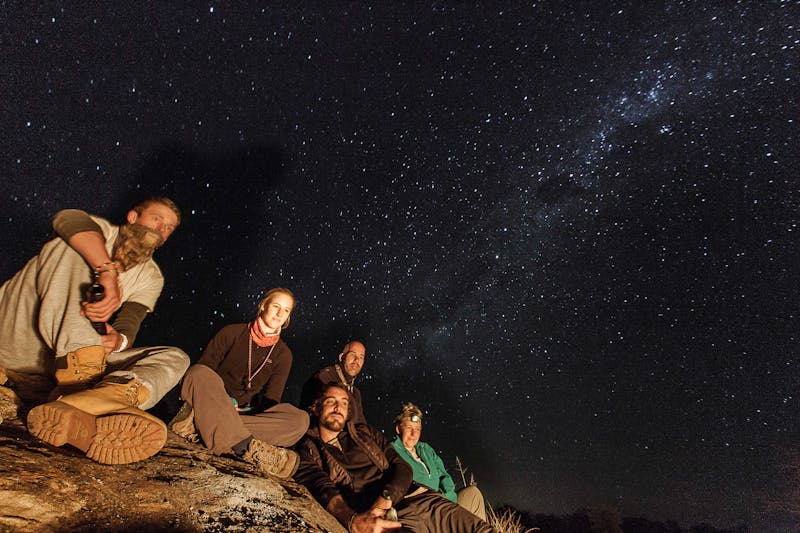
From dream to reality
I can hear them! All around me. Are they laughing at me? It's so dark. It is 4 am, and the fire is not the only one to keep me company. I constantly scan 360 degrees, more focused than ever. At every turn, I expect to come face to face with one of them, the hyenas who constantly taunt me. Because of the tiredness, I do not know if I would be happy or terrified to see one. And it is precisely this unsettling feeling that I was looking for when I chose this Game Ranger Guide Course. The rawness that surrounds me, the vulnerability that's driving me, that feeling of belonging in this place at this precise moment… I simply feel alive!
Hyenas will not come closer…
It's over a cup of hot rooibos tea that we share our experiences of the night. So, I'm not the only one who lived it as a dream, overcome by fatigue… A plan come true!
We are returning to the camp, exhausted by this short, beautiful night. I will try to rest up a little during the day because, at the end of it, we will face what we have all feared since the beginning of the adventure: The final exam. The same proposed to validate the Level 1 FGASA (first-level ranger guide). A review of forty questions about a wide range of subjects: guiding in the natural environment, geology, astronomy, trees and animal behaviour. We spent a good hour on this base test. And it is with pleasure that we all nailed it and realised our progress since our arrival. I could have never had the chance to learn that much about the bush without spending so much time with passionate rangers.
To celebrate this shared success (while compiling with general fatigue), Don gives us a brilliant idea: "What about watching a good movie?" But not just any: It's a choice of circumstance. "The Ghost and the Darkness" is based on a true story of two lions, man-eaters, who killed a hundred people in the Tsavo region of Kenya. Perfect to build confidence for our subsequent tracking in the bush!
After the theory, the next day is dedicated to practice: analysis of our camera trap's findings in the bush. We leave at daybreak to get our precious boxes back. They didn't move at all. By examining the site, tracks and broken branches, we can confidently say there has been some movement at night.
Back at camp, we crowded around Don, who began to download the pictures. Impalas, kudus, nyala… for both teams, it's a parade of herbivores. Then, further into the images from the boy's team, a jackal. Just the tip of his nose.
Our victory is secured when, on the screen, a beautiful brown hyena appears! There is something magical in these pictures. They show the unusual behaviour of animals rarely seen so close, and we all feel privileged to watch the show, even virtually.
JC interrupts this contemplative moment to tell us that this afternoon, we will go out of the reserve and take the opportunity to do some field exercises. He wants to evaluate our progress and whether we're more familiar with the bush. After coating my shoes with the red earth of Mapungubwe, I cannot help thinking: "I'm far from an expert, but I see, I feel, your African Science… Try me!"
Along the Limpopo River, the natural border between South Africa and Botswana, we will put into practice all the information we swallowed in the last few days. Shortly before arriving on the banks, JC launched our first challenge: To situate and orientate ourselves. The goal is to reach the river that lies to the west. Challenge accepted! We quickly find the North (with the sun's position and time, remember?) and start pointing in a westerly direction. Two things to know: Our shadow on the ground does not change after determining the order. It works like a compass needle! We must analyse it before starting and always keep it the same way.
It is also recommended to do another position check every ten minutes. Man tends to turn around in the great outdoors.
JC asked us about the trees' names and properties during this expedition. He also questions us about the reason for various tracks and traces and tries to guide us in a comprehensive reading of any situation we encounter. Like a crime scene, every little detail is helpful. It takes extreme concentration not to lose the thread; teamwork significantly helps the analysis. That feeling of being in the present moment, focused on the same goal, looking for one of the bush's truths hit me again… This is precisely what I came for!
After an hour of walking in the bush, we hear the river rumble in the distance. The closer we get, the more our attention wavers. Grave mistake – without consequence, this time!
"I'm starving! "I say. JC shows me the back of his bakkie. We extract timber, meat and vegetables… perfect for a delicious braai. We dig a hole in which we put the wood. I look into the bags to find something to light the fire… no lighter, no matches. A large smile appears on Don's face, and I understand instantly: Another lesson about "African science". I've already said I'm mesmerised by fire. Learning how to light it with my hands will put the same big smile on my face.
The idea is simple: Find a flexible timber to make the base and a hardwood to build the baton. Friction by rotation on the adjustable floor (previously cracked to provide air) will cause the appearance of smoke and embers… in theory!
Adding a lot of sweat and elephant dung to the equation is necessary. The smoke timidly appears after a quarter of an hour of working the baton. A bit more effort, and we will get that little spark. Covered with a mixture of straw and dung, this long-awaited flame should come.
JC gets the precious mixture in his hands and, by long and regular breaths, reveals to us the miracle. Here it is, the flame of life. It is impossible not to cheer despite bruised hands and arms aching. And I find nothing better to say: "I'm starving!"
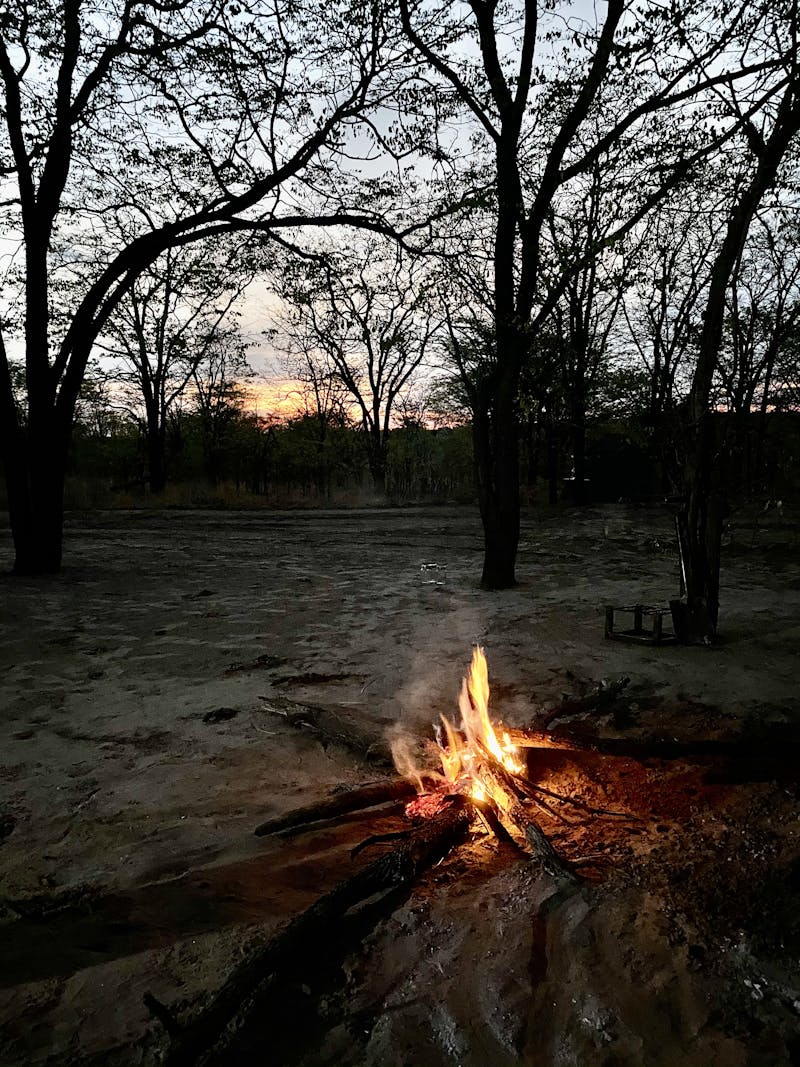
We are not in Mapungubwe anymore.
Our stay at Mapungubwe is coming to an end. It is time to leave the place that has awakened our senses and reconnected us to the natural world. Time to thank Don for teaching us so much and giving us his best stories. It is time to collect our stuff, books, notes, and memories and reach the Kruger National Park for three days of encounters and emotions. One door closes, another opens…
Ampie and Johan will be our guides for the next two days we will spend in the Kruger, during which we hope to see as many animals as possible. It will take us a few hours to reach the park gate's north entrance at Pafuri.
As soon as we entered the park, we were all amazed by the concentration of animals. Elephants, cape buffalo, blesbock, Wwterbuck … We are dazzled! After a week at Mapungubwe, the contrast is striking. We enjoy the game and take the opportunity to revise our knowledge of their identification, behaviour, and specific signs… we are an encyclopaedia on four wheels!
The day passed at breakneck speed, and we had to wait until nightfall to see our first cat. A lonely young lion is drinking water quietly at the corner of a pond, staring at us. Magical sighting… frustrating sighting. In a few seconds, he disappears into the thick vegetation. "Follow him!" I hear. But how are we supposed to do that? We're not in Mapungubwe anymore. And here's another observation: If animals don't have complete freedom in this national park, we don't either! Getting off the tracks makes it impossible to track the animals we want. And even less so on foot. A sad reality that reminds us of the unique experience of our previous week.
We spend a fantastic night under the stars in one of the many camping sites of the park, lulled by the unmistakable sound of impalas in a rut. A long day of driving ahead of us the next day, and we have to be at Bayule before sunset. Terry, a bush specialist, awaits us there. He will have difficulty checking our knowledge and finalising our learning so that we will leave this adventure in the best condition.
But, before these final lessons, we take a new road trip to make our cameras whirr! Once more, the day brings some incredible encounters. But this slight feeling of not being connected to the environment lingers. What strikes me the most is probably the difference in behaviour between animals met at Mapungubwe and those seen here: It's pretty easy to approach a zebra in the Kruger; it doesn't even pay me any attention. The animals are accustomed to human presence and do not consider us potential threats.
Their survival mechanisms and their wildest nature are altered. Some of the things I learned in the course about the behaviour of these animals can't be applied here in Kruger. Although this is a chance to see them so close, in relative freedom, I gain less pride and happiness than I gained from the wild encounters I've experienced in Mapungubwe.
We finally arrive at Bayule at the end of the day. We take a moment to enjoy the incredible view over the valley. Terry is one of the first people to greet us. He seems perfectly suited to the bush, small, unshaven and with lumberjack's hands. We soon understand his love for it, the place where he grew up and that he knows like the back of his damaged fingers. Tomorrow, we will again be his students—two days to discover this new place and refine our skills.
We will observe the animals we didn't have the chance to meet before. We will learn a lot about the ability of the bush to give us everything we need, "the best pharmacy". We will understand the interdependence of different species. And most importantly, we will respond with aplomb and conviction to most of Terry's questions. It is a reasonable team effort that Terry will not forget to underline, impressed by the excellent store of knowledge we gained quickly.
But the bush is unpredictable. It changes all the time. We would need a lifetime to be able to claim to know it, and those who forget to respect it will be promptly called to order. We were not far from our first penalty when, on the way back, in single file, we all walked just next to a puff adder. It took Johan's screams for us to realise the situation. A thrill ran through us… and we cannot say we were not warned!
Our adventure comes to an end! We have one last night to pass at Bundox, near Hoedspruit. My mind wanders, and I trace our progress since our arrival. I see those hours scouring the bush, the notes scribbled during our lessons, the bright stars over our heads every night. I feel each moment again with the same intensity: The night we arrived at Mapungubwe, our encounter with the giraffes, the hyenas around our camp during the sleep-out, the countless laughs with the team and all the friendships created. But the most intense emotion was about to come.
After a last braai and a few stories around the fire, we decide, exhausted, to go to bed. In the light of our torchlight, we entered their tent, set up in the middle of the reserve. Suddenly, a vast roar, followed by a screech, pierced the quietness of the savannah. "Did you hear that?" Jo whispered. Then I remembered what we were told by the owner this morning. A leopard has been observed in the same camp for the last two nights. In retrospect, our attitude at that time was not worthy of a ranger: We heard so much about this magnificent creature and knowing that he was so close… we had to see him! Armed with our ridiculous torchlight, we scan the bush. One step after another, we dangerously get closer. My heart beats wildly, I am alert, and I feel alive… but there is no sign of life after a few minutes of expectations and a few meters more of life. We decided, a little disappointed, to return to our tents.
Lying in my bed, wrapped in my multiple duvets (in the bush, the cold is intense at this time), I begin writing our exploits of the day. No sooner had I started to scribble a few words when a singular snap was heard behind our tent. Silence. Time stops. I freeze—a growl. My heart misses a beat. It is 5 meters from me and has only a slight nylon fabric between it and me. I cannot even turn my head or move my arms. I'm paralysed by the intensity of the moment. I do not even breathe. I hear footsteps, the creaking branches under his weight. His growl, the sound emanating from deep within the body, I will never forget…
Every minute seems like an eternity. I'm scared and, at the same time, enthralled by what's happening. The leopard is so unpredictable and so powerful. Leopards are timid animals and probably would not attack the tent for no reason, but I'm afraid! The fear is irrational, right?
It is now twenty minutes that it walks around the camp. It is not in a hurry to leave. I then try to relax and take the situation as a gift from the bush. This unique experience that I hoped for… I have received it. In a second, my body relaxes and soothes my mind while keeping my senses alert! I want to hear everything, experience everything, print everything in my memory and never forget. My eyes slowly closed, ending one of the most beautiful experiences of my life!
I fall asleep with the soul of a ranger, albeit still far from knowing one. This course allowed me to put one foot in their world and understand what it means to be and live as a ranger. I now possess a grain of knowledge and a mountain of passion that will allow me, if I choose, to push the adventure further. I was looking for a thrill, and I found it. This incredible experience will remain etched on my mind and my heart. And it will be this experience that I will share in the evening around the campfire, which is bound to raise a "WOW!"
